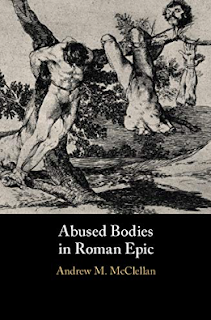Dr. Andrew M. McClellan (Ph.D., University of British Columbia)
Humanity has always been obsessed with the idea of the afterlife. Nowhere is this more powerfully – and frighteningly – articulated than in artistic conceptions of “Hell,” a dark, infernal place reserved for those deemed, at best, morally insufficient, and at worst, willfully malevolent. Though Hell for modern audiences carries unavoidable Christian overtones, the basic theoretical and conceptual outlines of a gloomy umbratic netherworld have existed across cultures for many millennia. This course investigates different representations of Hell in a variety of artistic “texts” from antiquity to the present. By studying closely the concept of Hell, students will explore artistic influences, compare different genres, and examine a range of cultural value systems. Some of the texts we will discuss this semester include The Epic of Gilgamesh, Homer’s Odyssey, Aristophanes’ Frogs, Plato’s Republic, Virgil’s Aeneid, Dante’s Inferno, Milton’s Paradise Lost, Blake’s The Marriage of Heaven and Hell, Neil Gaiman’s The Sandman, Gabriel Squailia’s Dead Boys, and the film Event Horizon.
MALAS-600AIMAGNING HELL:SCI ANTIQTY1600-1840. W NE-172 A.MCCLELLAN
 |
| click here for more info |
 Dr. Andrew M. McClellan (Ph.D., University of British Columbia) comes to San Diego State University from Florida State University, where he was a Postdoctoral Fellow in Classics from 2016-2018. Dr. McClellan's research explores the intersections of war, violence, and death in Greco-Roman epic poetry and society. He combines literary analysis with rigorous philological examination, and his work is informed by a broad cross-cultural appreciation of these themes in Western culture. While his research focuses broadly on epic poetry from Homer to the epics of the early Roman imperial period, the post-Augustan Latin epics have occupied most of his time recently. Dr. McClellan has just published a monograph that examines the (mis)treatment of corpses in Latin epic poetry (Abused Bodies in Roman Epic), a project that expands upon his PhD thesis. In addition, he's published articles and reviews on Homer's Iliad, Virgil's Aeneid, Statius' Thebaid, and Silius Italicus' Punica, and has book chapters forthcoming on Lucan's Civil War and on Classical "zombies" in Mary Shelley's Frankenstein.
Dr. Andrew M. McClellan (Ph.D., University of British Columbia) comes to San Diego State University from Florida State University, where he was a Postdoctoral Fellow in Classics from 2016-2018. Dr. McClellan's research explores the intersections of war, violence, and death in Greco-Roman epic poetry and society. He combines literary analysis with rigorous philological examination, and his work is informed by a broad cross-cultural appreciation of these themes in Western culture. While his research focuses broadly on epic poetry from Homer to the epics of the early Roman imperial period, the post-Augustan Latin epics have occupied most of his time recently. Dr. McClellan has just published a monograph that examines the (mis)treatment of corpses in Latin epic poetry (Abused Bodies in Roman Epic), a project that expands upon his PhD thesis. In addition, he's published articles and reviews on Homer's Iliad, Virgil's Aeneid, Statius' Thebaid, and Silius Italicus' Punica, and has book chapters forthcoming on Lucan's Civil War and on Classical "zombies" in Mary Shelley's Frankenstein. While at SDSU, he is excited to continue work on two new book projects. The first is an examination of "flyting" (the exchange of battlefield insults) in Roman epic, a major generic motif largely unexamined by scholars of Latin epic poetry. The second project surveys the reception of Classical "horror" in post-Classical literature, art, theater, and film from Dante to modern horror films. All of Dr. McClellan's research is animated by a profound interest in some of the darker elements of Greco-Roman literature, culture, and its reception that Classical scholarship has largely neglected.


No comments:
Post a Comment